- Home
- Pittacus Lore
Ashfall Legacy Page 13
Ashfall Legacy Read online
Page 13
Outside the circle of stones, a whole alien zoo’s worth of creatures stood somberly by, watching as the old elephant-dog slowly expired.
“This is fucked,” I blurted.
Aela elbowed me. “Syd.”
“Actually,” H’Jossu said, not seeming to take offense, “this is my little brother’s birth ritual.”
The creatures standing on death watch were a menagerie—there were some shaggy teddy bear things, a couple of literal spider monkeys with chimp torsos that ended in six skittering legs, a few other elephant-dogs, and more. These beasts all shared some common traits, though. For one, they stood upright like people. For two, they were all dead-looking, frozen in a state of decomposition. And finally, they were all covered in a bright white fungus.
“Personally, I find the sacred rituals of the Panalaxan Growth Mandate to be beautiful,” Aela said, giving me a disapproving look. “Please try harder, Syd.”
I forced myself to look at the creatures. Some of them had only small growths of fungus around their eyes and mouths, with sparse tufts popping up along their limbs. They were the younger
Panalaxan. The elders were absolutely covered in the stuff, thick mounds of mold making their animal bodies nearly unrecognizable. One big dude in particular, who I took to be the leader because he carried a gnarled bow staff in one clawed paw, had grown what appeared to be a functioning third arm made entirely of fungus.
H’Jossu patted my shoulder. “I get it, dude. I’ve seen enough Earth art to know how freaked out you guys are by death. Plus, my people have the word ‘mandate’ in their name. I mean, that’s totally a villain thing, right?”
I actually cracked a smile at that. “‘Panalaxan Growth Optional’ doesn’t have the same ring, I guess.”
H’Jossu let loose a raspy chuckle, then pointed into the crowd. “Look. There’s me.”
Of course I could see him there among the other mold-covered beasts. He was a big boy. This version of H’Jossu, from his memory, wasn’t quite so thickly covered in spores.
He was also singing.
They all were. The animals let out a dry, croaking sound, like wind rustling dead leaves. That was the fungus, operating the lungs of its deceased hosts.
“What are they saying?”
“It’s a chant to ease the dying mohunk’s passage,” H’Jossu replied.
The elephant-dog—a mohunk—must have gotten tired of listening to the creepy Panalaxan singing, because it let loose one last, heavy sigh, and then was completely still, its glassy eyes staring into space. Dead.
The ring of Panalaxan went silent.
After a few moments, the leader thumped his staff—once, twice, three times—into the dirt. At that signal, two other Panalaxan extended their fuzzy limbs toward the newly dead. Bright spores like snowflakes broke off from them, intermingled, and floated into the nostrils and eyes of the corpse.
It only took a few seconds for the mohunk to begin convulsing. Blossoms of mold pushed out from its eyes and nostrils. The recently dead creature flopped around, then let loose a shrill, raspy cry that seemed to silence the entire jungle. Finally, the mohunk—or was it a Panalax now?—stumbled to its feet like a newly born foal, uncertain of its own limbs. The thing took a few floundering steps out of the stone circle, then collapsed again and let out a whine. The rest of the Panalaxan onlookers came forward, crouching down and soothing the newly reanimated creature. The H’Jossu in the memory was first among them, reaching down to cradle his little brother.
Meanwhile, the H’Jossu next to me blotted at his eyeholes like he was crying. “Oh, Muf’Tong, he was such a sweet little growthling.” He paused. “Now he’s annoying as shit.”
“You’ve just witnessed your first Panalaxan birth,” Aela said cheerily to me. “Pretty cool, huh?”
“They’re zombies,” I said. “Plant-based zombies.”
“I find your revulsion quite interesting,” Aela said. “As I understand it, Earthers kill one hundred fifty million animals per day for food. A Panalax can live for a hundred years, sustaining itself on a single host body, water, and sunlight. Which do you think is the superior use of organic matter?”
I mean, the answer to that was obvious, and rationally I understood it, but I was still having a hard time accepting a society of friendly undead mildew. I crossed my arms and stood there silently.
“Speaking of zombies,” H’Jossu said, “what’s the superior version of The Walking Dead? TV or comic book?”
I gave him a mystified look. “The comic, obviously,” I replied. “How are you so into Earth stuff, anyway?”
“I took an elective on it during my first semester at Serpo and fell in love,” H’Jossu replied, clasping his paws over his chest. “So much action and suffering, so much hope, constantly grappling with your short life spans. It really speaks to me.”
Despite finding him kind of gross, I was starting to feel comfortable talking to H’Jossu. He spoke my language—not literally, of course, but still. Even the humans on the Eastwood hadn’t given me such a warm reception.
“H’Jossu,” Aela prodded gently. “Maybe now would be a good time to explain to Syd all the ways your people aren’t like made-up Earth monsters.”
“Well, we aren’t played out as all hell, for starters,” H’Jossu said. He thoughtfully scratched at his furry snout. “I guess Panalaxan are like zombies in that you have to eradicate our host brains to kill us. But we aren’t contagious, and we don’t kill our hosts—we wait for them to pass on naturally. And we’re really nice.”
“The Ghost Garden is the most biodiverse planet in all the systems,” Aela added, “largely thanks to the Panalaxan maintaining it.”
“We also supply a bunch of medicines to the Serpo Institute worlds,” H’Jossu said proudly. “All the quick-heal salve on the Eastwood was grown in the Ghost Garden.”
I gave the group of Panalaxan a second look. Most of them were still gathered around the newborn dead thing, playing with the little guy like you would a baby, picking him up and tossing him in the air. Others had formed a small ring around the two Panalaxan that had shed spores into the baby and were performing some kind of swaying dance. It was a celebration.
“Okay,” I said. “I’m not going to lie, the whole thing still makes me feel a little squeamish. But I’m going to try to get past it. And I’m really sorry I punched you the other day.”
“A breakthrough!” Aela cried.
Almost immediately, the jungle faded away. We were returned to Aela’s room—the Ossho wisp went out of our brains and back in their exo-suit. H’Jossu hopped excitedly across the room toward me. I still flinched a little, but mostly because he was nine feet tall.
“We are going to be best friends,” he declared.
I cautiously patted his wooly arm, surprised that his fur felt so soft. “Let’s not rush it, buddy.”
“Thank you for your assistance, H’Jossu,” Aela said. “Can you please send Zara in?”
Once the Panalax had shambled out, Aela turned to me.
“I apologize if I was harsh in there, criticizing your Earther eating habits.”
I waved my hand. “You made a good point for someone who’s never eaten a cheeseburger.”
“Oh, but I have experienced eating a cheeseburger,” Aela said. “As an Ossho, I try to collect as many memories as possible, whether firsthand or through others. It’s why I’m so passionate about interspecies understanding. One foolish bias could stand in the way of thousands of interesting encounters. And that’s why you’ve come to the Vastness, isn’t it?”
I’d come to the Vastness to find my missing father, but Aela’s version—where I traveled through space in search of the exciting and the mind-blowing—sounded pretty good, too. “Yeah,” I replied. “Of course.”
“Anyway, it will be easier with Zara,” Aela said. “Humans typically respond well to Vulpin.”
I wasn’t so sure that would be the case with me, but I stayed silent. At that moment, Zara swept into the r
oom, her rust-colored tail swishing behind her.
“Let’s get this over with,” she said, flashing me her fangs. She smoothed down the spiky shelf of fur across her shoulders. “Your damn chemical shower is hell on my coat.”
The door to Aela’s room sealed us in and the routine began again. The vents in Aela’s floor and ceiling doused us, then, with the air clean, Aela came spilling out of their exo-suit and flowed toward Zara and me.
Yet again, the scene changed.
The three of us stood on a cliff of red stone that reminded me of the sunburned peaks I’d once seen while driving through Arizona. The air here was dry and dusty, a huge crimson sun burning overhead. In the distance, beneath the crags, a city gleamed like a jewel in the middle of the desert. The buildings there were mostly domed and castle-like, small spacecraft zipping between sandstone obelisks. A Denzan interstellar vessel—the same model as the Eastwood—hovered over a tall building that gleamed with importance.
“Welcome to Stonlea,” Aela said. “Home world of the Vulpin One Pack.”
A happy shriek drew my attention away from the distant city. The first Vulpin I laid eyes on was a child, naked except for its patches of burned-orange fur, splashing around in a pool of crystalline water. My first thought was that it looked like a baby fox in a viral video.
“Aw,” I said, before I could stop myself. “Cute.”
“Cute,” Zara spat. “Any one of these cublets would eviscerate you, Earthling.”
I blinked, not sure how to respond to that. Zara sounded serious, but the idea was so ridiculous that I kind of felt like she was trolling me. She walked ahead of Aela and me, snout up, breathing in the dry air of her memory.
Next to me, Aela chuckled and shrugged. “The Vulpin are really sensitive about their resemblance to unevolved Earth mammals. Do not coo at them. Do not try to take their picture. Do not—I repeat—do not pet them.”
I smirked, thinking of my uncle Tycius. “Already knew that one.”
The rocks ahead parted to form a natural waterslide—a shallow crevice of smoothed stone covered by a twisting and turning stream that ended in a swimming hole. There were Vulpin everywhere, mostly younger ones. They took turns racing down the stony slide or else sunbathed by its edges, while small groups observed the action from the rocks above or floated idly in the pool below.
On average, the Vulpin were about a foot shorter than humans. Their skin was varying shades of bronze, where it wasn’t covered in patches of fur. Their pelt colors varied from deep mahogany to almost pink, as did the styles and cuts that they wore—some combed ornamental spikes along their shoulders and down their arms, others wore fancy manes, and some kept full heads of braids. Even the so-called cublets had sharp teeth and hands tipped with claws. They all had bushy tails that seemed like they would constantly get in the way, but judging by how they ran and swam—agile and carefree—tail awareness wasn’t a problem for these people.
“They must have to vacuum so much on this planet,” I said.
“Coat-sculpting is a big part of clan identity for the Vulpin,” Aela said. “Zara, would you like to explain?”
“Nope,” Zara replied, standing at the edge of the water. She stared down at a pack of buff Mohawk-sporting dudes glowering at the edge of the watering hole. They reminded me of a dozen hot-shit varsity sports teams I’d encountered back home.
Aela frowned but pressed on. “They call themselves the Vulpin One Pack during interplanetary relations because they want to present a unified front when dealing with other species, but politics on Stonlea are almost always in flux. You can tell who supports which faction—or den, as they call them—by how they groom themselves . . .”
While Aela explained the intricacies of Vulpin hairdos, I tried to picture the Vulpin who had attacked my mom. If I could remember how her coat was styled, maybe I could learn what den she was from and, from there, track down who sent her. I wondered if Ty had that kind of information from when he and the Consulate people found the Vulpin’s body in the outback.
“There’s never been a single war on Stonlea,” Aela was saying, having moved on from grooming. “Not a war like you’d think of one, anyway, with armies and widespread battles.”
“We humans do like blowing one another up,” I said.
“The Vulpin dens are involved in constant power struggles. It’s basically a planet-wide pastime,” Aela continued. “Instead of outright war, they engage in subterfuge and assassination. It’s a point of pride for them. Any loss of life seems totally wasteful to me, but at least the Vulpin are circumspect when it comes to killing each other.”
“Look,” Zara said, pointing up the cliff. “Here I come.”
The Zara-of-memory picked her way down from higher up. She must’ve been observing this scene from above, but now she cut a determined path toward the preening Mohawk boys at the watering hole.
The magenta streaks that made up Aela’s hair stood up. “Wait, what is this memory, Zara?”
Zara’s tail wagged. “I told you. It’s my proudest day, the day I left for the Serpo Institute.” She flashed Aela a feral grin. “Can you put me in first person, Aela? I want to really relive it. The Earthling can come, too. Get a true taste of Vulpin life.”
“I think I’m good,” I said.
“This isn’t exactly the formative experience I hoped you’d share,” Aela said, annoyed. The wisp squinted for a moment, and then Zara simply blinked out of existence.
“Where’d she go?” I asked.
Aela pointed toward the Zara sauntering closer to the swimming hole. “She’s experiencing the memory firsthand, like she asked. I have to warn you, Syd, this gets a little gruesome. We can stop now . . .”
“No,” I said. “No. I’m supposed to understand the Vulpin, right? I’d like to see.”
Aela nodded, and we both turned to watch.
“Oh, Kungo, where are you, Kungo?” Zara called out in a singsong voice.
The biggest Vulpin of the clique—or maybe he just had the tallest Mohawk—stepped forward. He grinned and waved at Zara, showing off a front fang that was cracked and broken, his snout laced with pink scars.
“Here I am,” Kungo declared. “You come to kiss me good-bye?”
Zara smiled back at him. I got the sense that the Vulpin showed teeth a lot, even when they weren’t necessarily happy. Sure-footed, Zara hopped across the slippery rocks, putting her on the same side of the stream as Kungo as she neared the pool.
“I hear you been talking mess, like you some big alpha,” Zara said. “Here I am, to hear it in the flesh.”
“And I hear you talking about how going off-world means you special or something. But we all know why you’re jetting. It’s because you come from a den of ass-sniffers and your daddy wants to whore you out like he did your momma. That what you came to hear?” Kungo waved a dismissive hand in the direction of the city. “Lucky your ride is here, Zara, you better run along. You keep looking at me with those heat eyes, I might not be able to control myself, get you tail-up right here on the rocks.”
All the action around the waterslide and on the rocks had completely stopped, every Vulpin tuned in to the confrontation. Even the little ones had given up on swimming to watch. No one seemed remotely interested in deescalating the situation.
A glint of metal caught my eye. Zara had a small, flat knife tucked against her palm. “You’re right. I got a ship to catch,” she said. “So hurry up and get your spanking, sister fucker.”
Kungo looked around at his friends, mocking disbelief on his face. “Can you believe this bitch?” He ran a hand through his Mohawk, and, when it emerged, he’d slipped on a spiked knuckleduster.
The talking was done. Both Vulpins’ fur bristled as they hunkered low, teeth bared in snarls. Scattered shouts and yips sounded from around the rocks, the onlookers encouraging this duel.
When Zara and Kungo went for each other, it happened fast. Kungo bull-rushed ahead, and Zara came to meet him, lighter on her feet. He snapped of
f three heavy punches, pretty much trying to knock Zara’s head off. She ducked one, absorbed the second on her shoulder, luckily from the fist not wrapped in spiked metal, and then swayed backward under the third, using her tail to prop her up.
Still balanced on her tail, Zara’s foot shot up, catching Kungo right between the legs. He doubled over, wheezing and clutching at himself.
Without hesitation, Zara spun her little knife around in her hand and plunged it dead into Kungo’s eye.
I clapped a hand over my mouth. “Holy shit.”
“Yeah,” Aela agreed. “She really goes for it.”
Kungo fell forward, whimpering and holding his face. Zara flicked her hand, spraying droplets of Kungo’s blood onto the rocks. Her knife was gone. At some point, she’d hidden it somewhere in her fur, so smooth I missed it. She reached down and patted Kungo’s back.
“See you never,” Zara said. She bowed deeply to the onlookers, turned on her heel, and sauntered back the way she’d come.
As Kungo’s friends dragged him away, playtime resumed on the rocks, young Vulpin sliding down into the pool, mere feet from where someone had just lost an eye. It was crazy. I thought I was going to watch the equivalent of a schoolyard brawl, not a maiming. Now, it wasn’t so hard to imagine one of the Vulpin attacking my mom. It was a little harder to imagine how she’d survived.
“I’m sorry, Syd,” Aela said. “This wasn’t the most helpful memory for an orientation. Zara’s impossible sometimes.”
I shook my head. I actually felt better now that I’d seen the two sides of Vulpin life—cute furballs frolicking in water and brutal knife fights. The creatures were no longer boogeydogs from a childhood nightmare. Now I knew what they were like—and I understood how nasty someone would have to be to send one to Earth after a mother and her child.
“Actually,” I told Aela, “I learned a lot.”
15
“So? What do you think so far?”
My uncle Tycius and I sat next to each other at the round table in the Eastwood’s galley, the first to arrive for dinner. In the ten days that I’d been aboard the Eastwood, Tycius and I hadn’t really had much time to catch up. When I wasn’t crashing hard from adjusting to space travel, I was working out to master my new strength or getting a rundown of alien cultures from Aela or training to operate the various environmental and navigation systems aboard the Eastwood. My uncle, meanwhile, was usually stuck at a terminal or in private meetings with Reno and Vanceval, catching up on all the Denzan current events he’d missed while stuck on Earth.

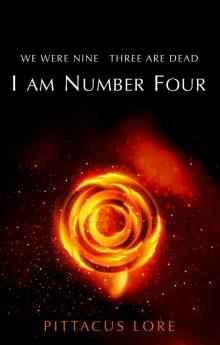 I Am Number Four
I Am Number Four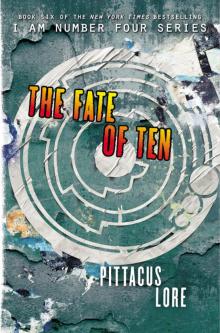 The Fate of Ten
The Fate of Ten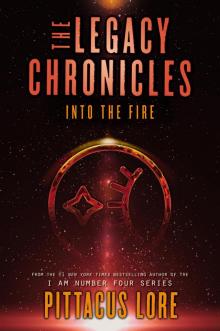 The Legacy Chronicles - Into the Fire
The Legacy Chronicles - Into the Fire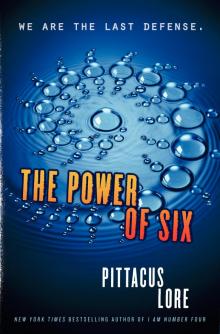 The Power of Six
The Power of Six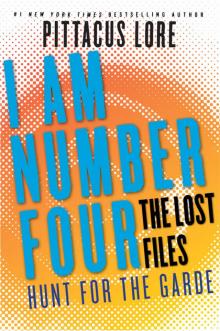 Hunt for the Garde
Hunt for the Garde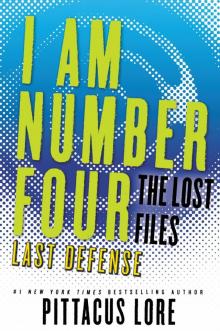 Last Defense
Last Defense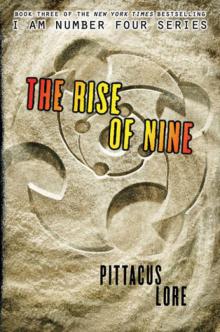 The Rise of Nine
The Rise of Nine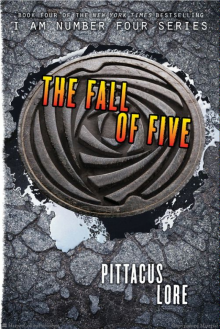 The Fall of Five
The Fall of Five The Fugitive
The Fugitive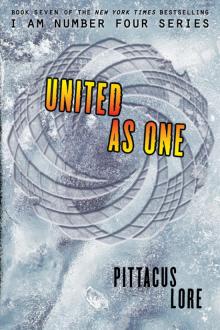 United as One
United as One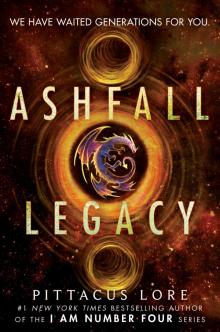 Ashfall Legacy
Ashfall Legacy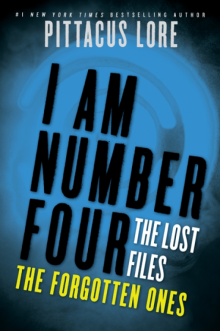 The Forgotten Ones
The Forgotten Ones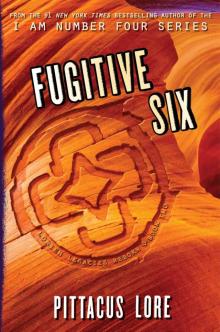 Fugitive Six
Fugitive Six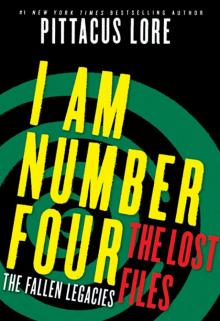 The Fallen Legacies
The Fallen Legacies![[Lorien Legacies 04.95] The Lost Files: Five's Betrayal Read online](http://i1.bookreadfree.com/28/lorien_legacies_04_95_the_lost_files_fives_betrayal_preview.jpg) [Lorien Legacies 04.95] The Lost Files: Five's Betrayal
[Lorien Legacies 04.95] The Lost Files: Five's Betrayal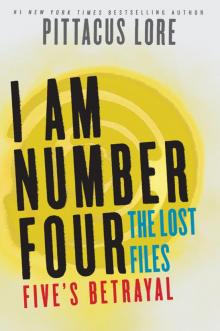 Five's Betrayal
Five's Betrayal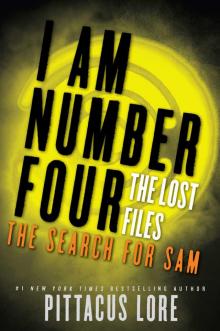 The Search for Sam
The Search for Sam![[Lorien Legacies 04.85] The Lost Files: The Forgotten Ones Read online](http://i1.bookreadfree.com/28/lorien_legacies_04_85_the_lost_files_the_forgotten_ones_preview.jpg) [Lorien Legacies 04.85] The Lost Files: The Forgotten Ones
[Lorien Legacies 04.85] The Lost Files: The Forgotten Ones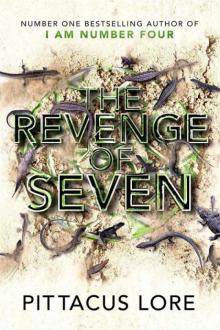 The Revenge of Seven
The Revenge of Seven![[Lorien Legacies 06.3] The Lost Files: Hunt for the Garde Read online](http://i1.bookreadfree.com/07/lorien_legacies_06_3_the_lost_files_hunt_for_the_garde_preview.jpg) [Lorien Legacies 06.3] The Lost Files: Hunt for the Garde
[Lorien Legacies 06.3] The Lost Files: Hunt for the Garde![[Lorien Legacies 04.0] The Fall of Five Read online](http://i1.bookreadfree.com/03/lorien_legacies_04_0_the_fall_of_five_preview.jpg) [Lorien Legacies 04.0] The Fall of Five
[Lorien Legacies 04.0] The Fall of Five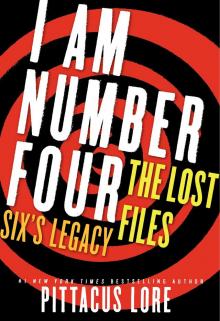 Nines Legacy
Nines Legacy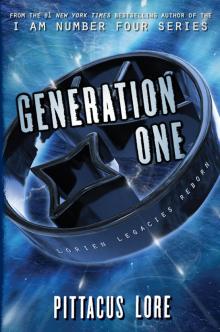 Generation One LLR
Generation One LLR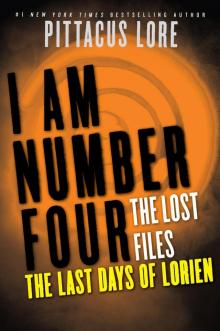 The Last Days of Lorien
The Last Days of Lorien![[Lorien Legacies 05.1] The Lost Files: The Fugitive Read online](http://i1.bookreadfree.com/i/03/14/lorien_legacies_05_1_the_lost_files_the_fugitive_preview.jpg) [Lorien Legacies 05.1] The Lost Files: The Fugitive
[Lorien Legacies 05.1] The Lost Files: The Fugitive![[Lorien Legacies 06.0] The Fate of Ten Read online](http://i1.bookreadfree.com/07/lorien_legacies_06_0_the_fate_of_ten_preview.jpg) [Lorien Legacies 06.0] The Fate of Ten
[Lorien Legacies 06.0] The Fate of Ten![[Lorien Legacies 06.2] The Lost Files: Last Defense Read online](http://i1.bookreadfree.com/08/lorien_legacies_06_2_the_lost_files_last_defense_preview.jpg) [Lorien Legacies 06.2] The Lost Files: Last Defense
[Lorien Legacies 06.2] The Lost Files: Last Defense![[Lorien Legacies 04.9] The Lost Files: Five's Legacy Read online](http://i1.bookreadfree.com/i/03/16/lorien_legacies_04_9_the_lost_files_fives_legacy_preview.jpg) [Lorien Legacies 04.9] The Lost Files: Five's Legacy
[Lorien Legacies 04.9] The Lost Files: Five's Legacy The Navigator
The Navigator![[Lorien Legacies 04.94] The Lost Files: Return to Paradise Read online](http://i1.bookreadfree.com/i/03/13/lorien_legacies_04_94_the_lost_files_return_to_paradise_preview.jpg) [Lorien Legacies 04.94] The Lost Files: Return to Paradise
[Lorien Legacies 04.94] The Lost Files: Return to Paradise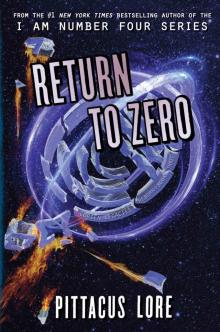 Return to Zero
Return to Zero![[Lorien Legacies 01.5] The Lost Files: The Fallen Legacies Read online](http://i1.bookreadfree.com/09/lorien_legacies_01_5_the_lost_files_the_fallen_legacies_preview.jpg) [Lorien Legacies 01.5] The Lost Files: The Fallen Legacies
[Lorien Legacies 01.5] The Lost Files: The Fallen Legacies![[Lorien Legacies 05.7] The Lost Files: The Guard Read online](http://i1.bookreadfree.com/i/03/13/lorien_legacies_05_7_the_lost_files_the_guard_preview.jpg) [Lorien Legacies 05.7] The Lost Files: The Guard
[Lorien Legacies 05.7] The Lost Files: The Guard![[Lorien Legacies 06.1] The Lost Files: Legacies Reborn Read online](http://i1.bookreadfree.com/i/03/13/lorien_legacies_06_1_the_lost_files_legacies_reborn_preview.jpg) [Lorien Legacies 06.1] The Lost Files: Legacies Reborn
[Lorien Legacies 06.1] The Lost Files: Legacies Reborn![[Lorien Legacies 03.0] The Rise of Nine Read online](http://i1.bookreadfree.com/10/lorien_legacies_03_0_the_rise_of_nine_preview.jpg) [Lorien Legacies 03.0] The Rise of Nine
[Lorien Legacies 03.0] The Rise of Nine![[Lorien Legacies 02.0] The Power of Six Read online](http://i1.bookreadfree.com/i/03/14/lorien_legacies_02_0_the_power_of_six_preview.jpg) [Lorien Legacies 02.0] The Power of Six
[Lorien Legacies 02.0] The Power of Six![[Lorien Legacies 04.6] The Lost Files: The Search for Sam Read online](http://i1.bookreadfree.com/i/03/17/lorien_legacies_04_6_the_lost_files_the_search_for_sam_preview.jpg) [Lorien Legacies 04.6] The Lost Files: The Search for Sam
[Lorien Legacies 04.6] The Lost Files: The Search for Sam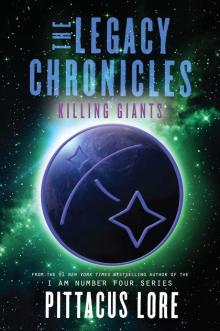 The Legacy Chronicles: Killing Giants
The Legacy Chronicles: Killing Giants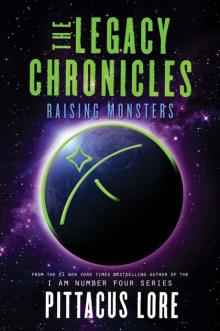 The Legacy Chronicles: Raising Monsters
The Legacy Chronicles: Raising Monsters![[Lorien Legacies 05.4] The Lost Files: The Navigator Read online](http://i1.bookreadfree.com/i/03/17/lorien_legacies_05_4_the_lost_files_the_navigator_preview.jpg) [Lorien Legacies 05.4] The Lost Files: The Navigator
[Lorien Legacies 05.4] The Lost Files: The Navigator![[Lorien Legacies 07.0] United as One Read online](http://i1.bookreadfree.com/i/03/18/lorien_legacies_07_0_united_as_one_preview.jpg) [Lorien Legacies 07.0] United as One
[Lorien Legacies 07.0] United as One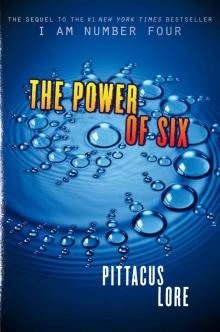 The Power of Six (I Am Number Four)
The Power of Six (I Am Number Four)![[Lorien Legacies 03.5] The Lost Files: Nine's Legacy Read online](http://i1.bookreadfree.com/i/03/18/lorien_legacies_03_5_the_lost_files_nines_legacy_preview.jpg) [Lorien Legacies 03.5] The Lost Files: Nine's Legacy
[Lorien Legacies 03.5] The Lost Files: Nine's Legacy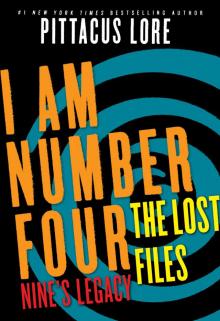 I Am Number Four: The Lost Files: Nine’s Legacy
I Am Number Four: The Lost Files: Nine’s Legacy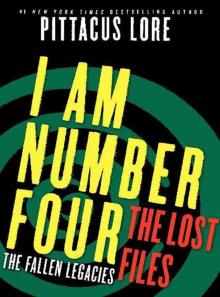 The Lost Files: The Fallen Legacies (i am number four)
The Lost Files: The Fallen Legacies (i am number four)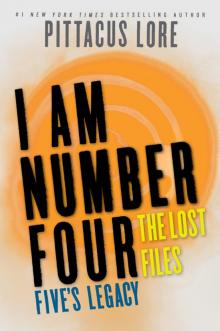 Five's Legacy
Five's Legacy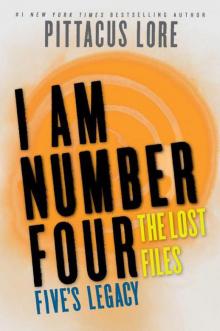 I Am Number Four: The Lost Files: Five's Legacy
I Am Number Four: The Lost Files: Five's Legacy![[Lorien Legacies 05.0] The Revenge of Seven Read online](http://i1.bookreadfree.com/i1/03/30/lorien_legacies_05_0_the_revenge_of_seven_preview.jpg) [Lorien Legacies 05.0] The Revenge of Seven
[Lorien Legacies 05.0] The Revenge of Seven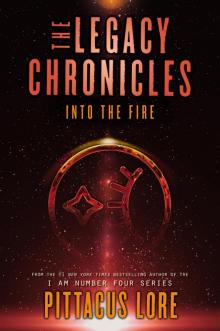 The Legacy Chronicles
The Legacy Chronicles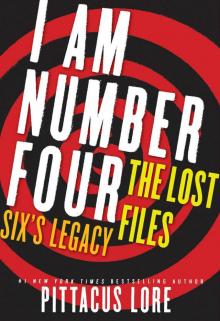 The Lost Files: Six's Legacy
The Lost Files: Six's Legacy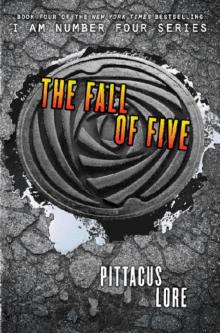 The Fall of Five (I Am Number Four)
The Fall of Five (I Am Number Four)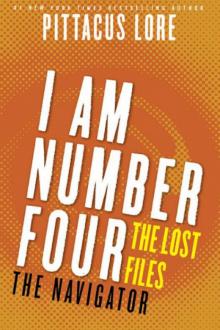 The Lost Files: The Navigator
The Lost Files: The Navigator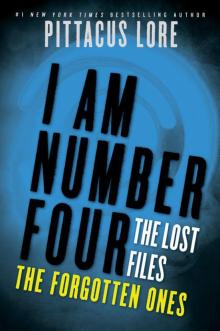 I Am Number Four: The Lost Files: The Forgotten Ones
I Am Number Four: The Lost Files: The Forgotten Ones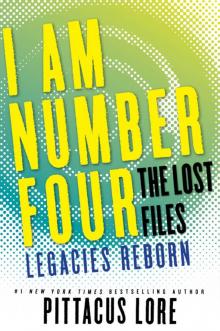 Legacies Reborn
Legacies Reborn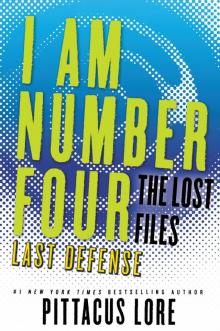 I Am Number Four: The Lost Files: Last Defense
I Am Number Four: The Lost Files: Last Defense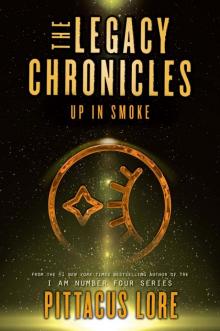 The Legacy Chronicles_Up in Smoke
The Legacy Chronicles_Up in Smoke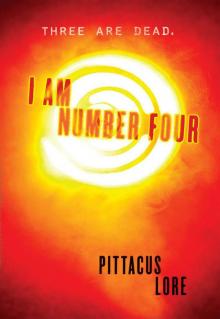 I Am Number Four ll-1
I Am Number Four ll-1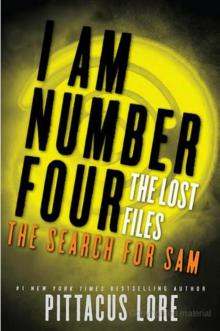 The Search for Sam lltlf-4
The Search for Sam lltlf-4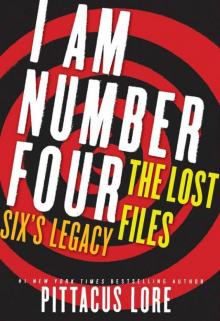 The Lost Files: Six's Legacy (lorien legacies)
The Lost Files: Six's Legacy (lorien legacies)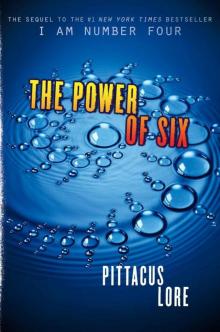 The Power of Six tll-2
The Power of Six tll-2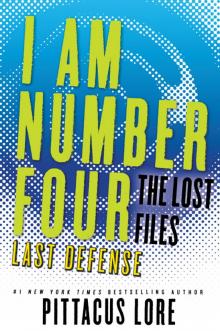 I Am Number Four: The Lost Files #14
I Am Number Four: The Lost Files #14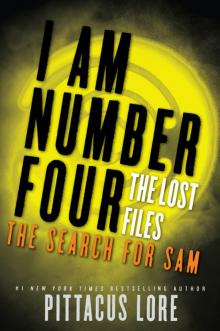 I Am Number Four: The Lost Files: The Search for Sam
I Am Number Four: The Lost Files: The Search for Sam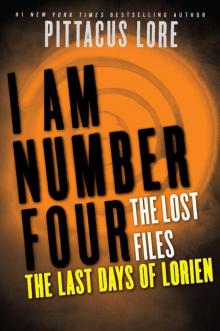 I Am Number Four: The Lost Files: The Last Days of Lorien
I Am Number Four: The Lost Files: The Last Days of Lorien